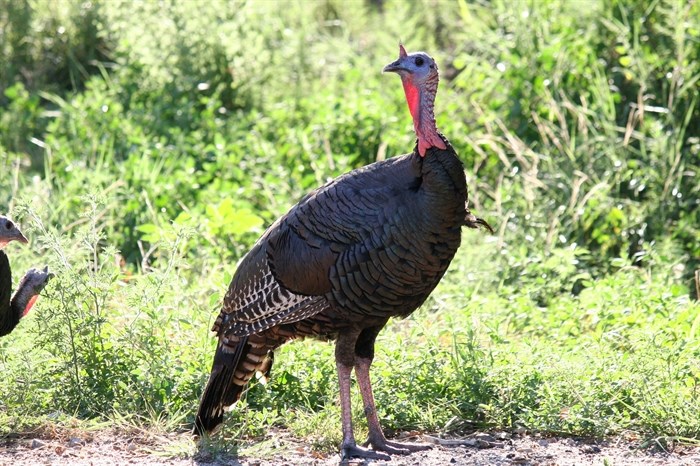
A file photo of a wild turkey.
Image Credit: SUBMITTED/Pixabay
October 10, 2021 - 12:00 PM
If you have turkey at Christmas, you probably got it at the supermarket, but in Castlegar, if you’re not careful, the turkeys just might find you.
Wild turkeys have been multiplying in parts of the Kootenays to the point of becoming a nuisance. Last year around this time, one flew through Marcia Bryant's dining room window.
"I was upstairs thankfully, or else I would have been covered in glass," she said. "The turkey was stunned and within a minute or two it came to, and started flying around trying to get out, and my husband managed to direct it through the hall... there were feathers (everywhere) and it broke a cupboard door."
"The window was taped up when the kids came over for Christmas.”
Wild turkeys, or meleagris gallopavo, are native to southwestern and southeastern parts of North America but were introduced to this part of the continent for hunting purposes since 1910, more significantly since the 1960s, according to The B.C. Breeding Bird Atlas. Plenty can be found in certain parts of the Okanagan and they’re a popular game bird.
But in the Kootenays, the population has grown so large it’s causing problems.
Vito Lacullo, also from Castlegar, has turkeys nesting in a big tree in his subdivision.
“Every year they’re getting and worse here,” he said. "There are probably 50 of them and they destroy everything. They’ll go through your garden and clean everything out, flowers, you name it. Not to mention they (poop) everywhere.”
They also block the road and have no fear of cars, he said, adding that some people also feed them and coyotes are “bombing around here now.”
“I don’t know what you can do with them,” he said. "They multiply so fast it’s crazy.”
READ MORE: Troublesome wild turkeys ruffle feathers in southeastern B.C. community
They’ve become such a nuisance for residents and drivers, the Regional District of East Kootenay is trying to establish a bylaw to prevent people from feeding them, though the B.C. government appears to have stepped up. A new regulation for 2020-21 makes it unlawful to intentionally feed or bait turkeys (or ungulates) in the Kootenay region, except under permit.
The regional district is trying to address complaints from residents but also recognizes some people are happy to have them around.
“(The proposed bylaw) was for the intentional feeding of wildlife,” said Sandford Brown, development services manager for the regional district. “(They’re) getting on some people’s nerves and (to) other’s delight.”
They also bring delight to hunters as a game bird.
Nick Kozub, Oceola Fish and Game Club president, said turkeys were released onto private land adjacent to Crown land by the club roughly 20 years ago for hunting purposes in the Lake Country area.
“We have a huntable population in certain areas. There are quite a few of them up at Predator Ridge and around Ellison…. The populations have increased and I’ve heard of them around the Lakestone area,” he said.
Once plucked and cleaned, the bird becomes unrecognizable. They’re not like farmed turkeys, Kozub said.
“Their breasts are phenomenal eating,” he said.
Unlike farmed cousins, wild turkeys run a lot, making legs and thighs tough and while some hunters won't eat those parts, he likes to turn them into burger patties, he said.
The bird weighs about 20 pounds with roughly eight pounds of meat, Kozub said.
Hunting season for wild turkeys is in the spring and fall with a draw available in December for the Kootenay region only. Be sure to check local regulations.
And you can’t buy them because it’s illegal to sell wild meat under the B.C. Wildlife Act.
- This story was originally published Dec. 20, 2020.
To contact a reporter for this story, email Carli Berry or call 250-864-7494 or email the editor. You can also submit photos, videos or news tips to the newsroom and be entered to win a monthly prize draw.
We welcome your comments and opinions on our stories but play nice. We won't censor or delete comments unless they contain off-topic statements or links, unnecessary vulgarity, false facts, spam or obviously fake profiles. If you have any concerns about what you see in comments, email the editor in the link above.
News from © iNFOnews, 2021